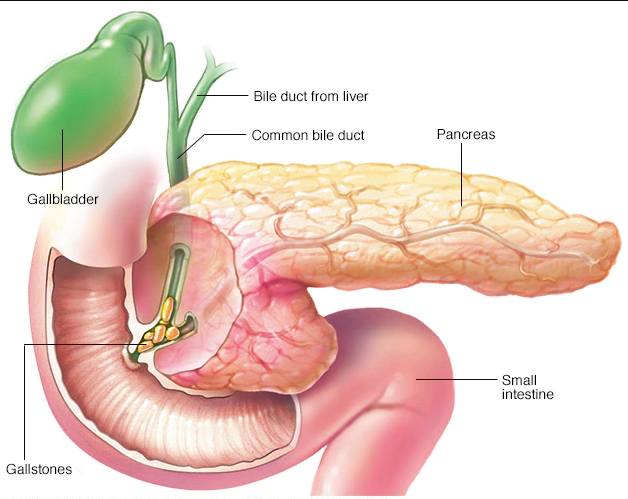Pancreatitis is inflammation in the pancreas. Pancreatitis may start suddenly and last for days or it can occur over many years. It has many causes, including gallstones and chronic, heavy alcohol use.
Gallstones are a common known cause of pancreatitis. Gallstones, built up in the gallbladder, can block the bile duct. This stops the pancreatic enzymes from traveling to the small intestine and forcing them back into the pancreas.
These enzymes then starts to irritate the cells of the pancreas, causing the inflammation associated with pancreatitis.

Mild cases of pancreatitis may go away without treatment, but severe cases can cause life-threatening complications.
There are two forms of pancreatitis: acute and chronic.
Acute pancreatitis – Meaning it appears suddenly and lasts for days.
Chronic pancreatitis – Meaning pancreatitis that occurs over many years.
SYMPTOMS
Symptoms of Acute pancreatitis:
- Upper abdominal pain
- Abdominal pain that radiates to your back
- Abdominal pain that feels worse after eating
- Fever
- Rapid pulse
- Nausea
- Vomiting
- Tenderness when touching the abdomen
Symptoms of Chronic pancreatitis:
- Upper abdominal pain
- Losing weight without trying
- Oily, smelly stools (steatorrhea)
CAUSES
One of the common cause of pancreatitis are gallstones (as explained above). But there are certain other factors that provokes this disease. In up to 15% of people with acute pancreatitis, the cause is unknown.
Other conditions that can lead to pancreatitis include:
- Alcoholism
- Abdominal surgery
- Certain medications
- Cigarette smoking
- Cystic fibrosis
- Family history of pancreatitis
- High calcium levels in the blood (hypercalcemia), which may be caused by an overactive parathyroid gland (hyperparathyroidism)
- High triglyceride levels in the blood (hypertriglyceridemia)
- Infection
- Injury to the abdomen
- Pancreatic cancer
WHEN TO SEE A GASTROENTEROLOGIST
Make an appointment with your nearby gastroenterologist if you have a continuous abdominal pain. Seek immediate medical help if your abdominal pain is so severe making it difficult to sit still or find a position that makes you more comfortable.





No comments yet.